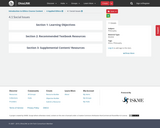
- Subject:
- Philosophy
- Material Type:
- Module
- Date Added:
- 05/16/2019

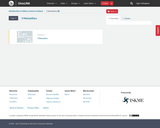
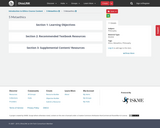
This section includes introductory and intermediate resources for metaethics. It includes links to open education textbooks with chapters on metaethics that can be used for a brief introduction to meta-ethics, as well as original source readings on topics in meta-ethics. A link to Plato's Euthyphro is included for discussion of the Euthyphro problem, which is related to criticisms of Divine Command Theory and issues having to do with the source and justification of moral judgments. As well, portions of Hume's Treatise is included as it regards the source and justification of moral judgments. There are also links to G. E. Moore's Open Question argument and other links to help students understand the main issues in metaethics. The textbook chapters and original source materials can be used together to orient students to the main issues, as well as to introduce them to the original arguments.
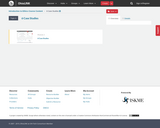
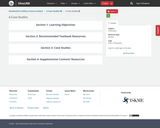

The goal of this text is to present philosophy to newcomers as a living discipline with historical roots. While a few early chapters are historically organized, my goal in the historical chapters is to trace a developmental progression of thought that introduces basic philosophical methods and frames issues that remain relevant today. Later chapters are topically organized. These include philosophy of science and philosophy of mind, areas where philosophy has shown dramatic recent progress. This text concludes with four chapters on ethics, broadly construed. I cover traditional theories of right action in the third of these. Students are first invited first to think about what is good for themselves and their relationships in a chapter of love and happiness. Next a few meta-ethical issues are considered; namely, whether they are moral truths and if so what makes them so. The end of the ethics sequence addresses social justice, what it is for one’s community to be good. Our sphere of concern expands progressively through these chapters. Our inquiry recapitulates the course of development into moral maturity
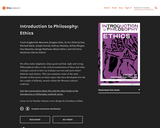
We often make judgments about good and bad, right and wrong. Philosophical ethics is the critical examination of these and other concepts central to how we evaluate our own and each others’ behavior and choices.
This text examines some of the main threads of discussion on these topics that have developed over the last couple of millenia, mostly within the Western cultural tradition. It considers basic questions about moral and ethical judgment: Is there such a thing as something that is really right or really wrong independent of time, place and perspective? What is the relationship between religion and ethics? How can we reconcile self-interest and ethics? Is it ever acceptable to harm one person in order to help others? What do recent discussions in evolutionary biology or have to say about human moral systems? What is the relation between gender and ethics? The authors invite you to participate in their exploration of these and many other questions in philosophical ethics.
If you are adopting or adapting this book for a course, please let us know on our adoption form for the Introduction to Philosophy open textbook series: https://docs.google.com/forms/d/e/1FAIpQLSdwf2E7bRGvWefjhNZ07kgpgnNFxVxxp-iidPE5gfDBQNGBGg/viewform?usp=sf_link.
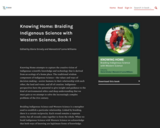
Knowing Home attempts to capture the creative vision of Indigenous scientific knowledge and technology that is derived from an ecology of a home place. The traditional wisdom component of Indigenous Science—the values and ways of decision-making—assists humans in their relationship with each other, the land and water, and all of creation. Indigenous perspectives have the potential to give insight and guidance to the kind of environmental ethics and deep understanding that we must gain as we attempt to solve the increasingly complex problems of the 21st century.

Terence Lau & Lisa Johnson's The Legal and Ethical Environment of Business is a book for today's student, who expects learning to be comprised not only of substance, but also of interactive exercises and multimedia. This book streamlines the presentation of material to ensure that every page is relevant, engaging, and interesting to undergraduate business students, without losing the depth of coverage that they need to be successful in their academic journeys and in their professional careers. This is not Legal Environment of Business (LEB) ”light.“ Rather, this is LEB without risk of students' eyes glazing over in boredom or from lack of comprehension. This is LEB presented in an exciting way, where every page is interesting to students and relevant to real life.
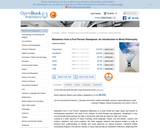
Metaethics from a First Person Standpoint addresses in a novel format the major topics and themes of contemporary metaethics, the study of the analysis of moral thought and judgement. Metathetics is less concerned with what practices are right or wrong than with what we mean by ‘right’ and ‘wrong.’
Looking at a wide spectrum of topics including moral language, realism and anti-realism, reasons and motives, relativism, and moral progress, this book engages students and general readers in order to enhance their understanding of morality and moral discourse as cultural practices. Catherine Wilson innovatively employs a first-person narrator to report step-by-step an individual’s reflections, beginning from a position of radical scepticism, on the possibility of objective moral knowledge. The reader is invited to follow along with this reasoning, and to challenge or agree with each major point. Incrementally, the narrator is led to certain definite conclusions about ‘oughts’ and norms in connection with self-interest, prudence, social norms, and finally morality. Scepticism is overcome, and the narrator arrives at a good understanding of how moral knowledge and moral progress are possible, though frequently long in coming.
Accessibly written, Metaethics from a First Person Standpoint presupposes no prior training in philosophy and is a must-read for philosophers, students and general readers interested in gaining a better understanding of morality as a personal philosophical quest.
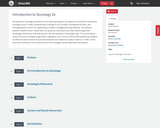
Introduction to Sociology 2e adheres to the scope and sequence of a typical, one-semester introductory sociology course. It offers comprehensive coverage of core concepts, foundational scholars, and emerging theories, which are supported by a wealth of engaging learning materials. The textbook presents detailed section reviews with rich questions, discussions that help students apply their knowledge, and features that draw learners into the discipline in meaningful ways. The second edition retains the book’s conceptual organization, aligning to most courses, and has been significantly updated to reflect the latest research and provide examples most relevant to today’s students. In order to help instructors transition to the revised version, the 2e changes are described within the preface.
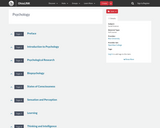
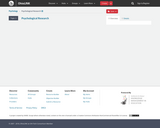
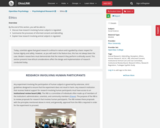
By the end of this section, you will be able to:
Discuss how research involving human subjects is regulated
Summarize the processes of informed consent and debriefing
Explain how research involving animal subjects is regulated
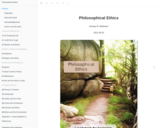
This book is an introduction to philosophical ethics intended for use in introductory college or high school level courses. It has grown out of lecture notes I shared with the first students who took my online Ethics course at the Pennsylvania College of Technology almost 20 years ago. Since then it has seen more development in a variety of forms – starting out as a pdf document, and then evolving into a static set of WordPress pages and finally now as a book written in bookdown and hosted at GitHub. This text represents my attempt to scratch a couple of itches. The first is my wanting a presentation of the major philosophical approaches to ethics that I can actually agree with and that is integrated into my overall teaching method. I tend to teach philosophy to beginners and so there is a fair amount of discussion of the tools used by philosophers and of the ways in which their approach differs from that of their colleagues in other disciplines.
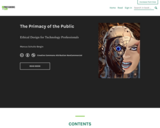
The Primacy of the Public presents a framework for engineering and technology ethics focused around three core ethical principles: the principle of welfare, the autonomy principle, and the fairness principle. To support this framework, the book begins with an examination of multiple perspectives we may take on engineering and technology, all of which support the centrality of ethical analysis and evaluation. These include the nature of engineering as a profession, the social context of engineering and technology, and the view that many technologies constitute social experiments.
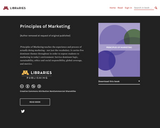
Principles of Marketing teaches the experience and process of actually doing marketing - not just the vocabulary. It carries five dominant themes throughout in order to expose students to marketing in today's environment: Service dominant logic, sustainability, ethics and social responsibility, global coverage, and metrics.

Introducing public health ethics poses two special challenges. First, it is a relatively new field that combines public health and practical ethics. Its unfamiliarity requires considerable explanation, yet its scope and emergent qualities make delineation difficult. Moreover, while the early development of public health ethics occurred in a western context, its reach, like public health itself, has become global. A second challenge, then, is to articulate an approach specific enough to provide clear guidance yet sufficiently flexible and encompassing to adapt to global contexts. Broadly speaking, public health ethics helps guide practical decisions affecting population or community health based on scientific evidence and in accordance with accepted values and standards of right and wrong. In these ways, public health ethics builds on its parent disciplines of public health and ethics. This dual inheritance plays out in the definition the U.S. Centers for Disease Control and Prevention (CDC) offers of public health ethics: “A systematic process to clarify, prioritize, and justify possible courses of public health action based on ethical principles, values and beliefs of stakeholders, and scientific and other information” (CDC 2011). Public health ethics shares with other fields of practical and professional ethics both the general theories of ethics and a common store of ethical principles, values, and beliefs. It differs from these other fields largely in the nature of challenges that public health officials typically encounter and in the ethical frameworks it employs to address these challenges. Frameworks provide methodical approaches or procedures that tailor general ethical theories, principles, values, and beliefs to the specific ethical challenges that arise in a particular field. Although no framework is definitive, many are useful, and some are especially effective in particular contexts. This chapter will conclude by setting forth a straightforward, stepwise ethics framework that provides a tool for analyzing the cases in this volume and, more importantly, one that public health practitioners have found useful in a range of contexts. For a public health practitioner, knowing how to employ an ethics framework to address a range of ethical challenges in public health—a know-how that depends on practice—is the ultimate take-home message.
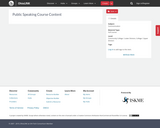
The Public Speaking course was developed through the Ohio Department of Higher Education OER Innovation Grant. This work was completed and the course was posted in September 2019. The course is part of the Ohio Transfer Assurance Guides and is also named OCM013. For more information about credit transfer between Ohio colleges and universities, please visit: www.ohiohighered.org/transfer.Team LeadJessica Papajcik Stark State College Content ContributorsJames Jarc Central Ohio Technical CollegeJanny Nauman North Central State CollegeCarrie Tomko University of Akron LibrarianAllen Reichert Otterbein UniversityReview TeamLaura Garcia Washington State Community CollegeJasmine Roberts Ohio State University